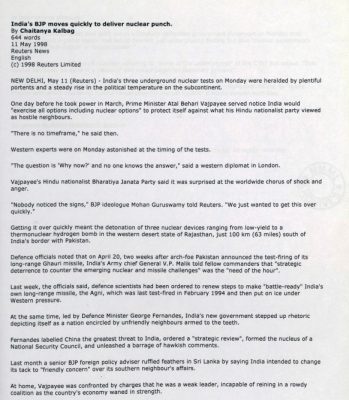India’s BJP moves quickly to deliver nuclear punch
[Reuters]
Published date: 11th May 1998
11 May 1998
Reuters News
English
(c) 1998 Reuters Limited
NEW DELHI, May 11 (Reuters) – India’s three underground nuclear tests on Monday were heralded by plentiful portents and a steady rise in the political temperature on the subcontinent.
One day before he took power in March, Prime Minister Atal Behari Vajpayee served notice India would “exercise all options including nuclear options” to protect itself against what his Hindu nationalist party viewed as hostile neighbours.
“There is no timeframe, ” he said then.
Western experts were on Monday astonished at the timing of the tests.
“The question is ‘Why now?’ and no one knows the answer,” said a western diplomat in London.
Vajpayee’s Hindu nationalist Bharatiya Janata Party said it was surprised at the worldwide chorus of shock and anger.
“Nobody noticed the signs,” BJP ideologue Mohan Guruswamy told Reuters. “We just wanted to get this over quickly.”
Getting it over quickly meant the detonation of three nuclear devices ranging from low-yield to a thermonuclear hydrogen bomb in the western desert state of Rajasthan, just 100 km (63 miles) south of India’s border with Pakistan.
Defence officials noted that on April 20, two weeks after arch-foe Pakistan announced the test-firing of its long-range Ghauri missile, India’s Army chief General V.P. Malik told fellow commanders that “strategic deterrence to counter the emerging nuclear and missile challenges” was the “need of the hour”.
Last week, the officials said, defence scientists had been ordered to renew steps to make “battle-ready” India’s own long-range missile, the Agni, which was last test-fired in February 1994 and then put on ice under Western pressure.
At the same time, led by Defence Minister George Fernandes, India’s new government stepped up rhetoric depicting itself as a nation encircled by unfriendly neighbours armed to the teeth.
Fernandes labelled China the greatest threat to India, ordered a “strategic review”, formed the nucleus of a National Security Council, and unleashed a barrage of hawkish comments.
Last month a senior BJP foreign policy adviser ruffled feathers in Sri Lanka by saying India intended to change its tack to “friendly concern” over its southern neighbour’s affairs.
At home, Vajpayee was confronted by charges that he was a weak leader, Incapable of reining in a rowdy coalition as the country’s economy waned in strength.
“The situation facing the new government is extremely delicate,” India Today magazine wrote. “It must overcome its own fractured mandate, even while confronting a well-established Chinese-Pakistani axis.”
It is clear that Vajpayee, who also holds the foreign affairs portfolio, has his job cut out for him over the next few weeks in the face of the world’s dismay.
India has refused to sign the Comprehensive Test Ban Treaty (CTBT) and stayed out of the Nuclear Non-Proliferation Treaty, saying it legitimises keeping weapons in the hands of a few nations while forcing others to renounce the option to build them.
“It is a repudiation of the policy of nuclear apartheid that the West sought to impose on us,” BJP president Kushabhau Thakre said, “The government has demonstrated that, unlike previous regimes, it shall not give in to international pressure.”
New Delhi’s balancing act was spelt out in a carefully calibrated government statement on Monday that pledged to back a global treaty that would ban not just underground testing but also “related experiments described as ‘sub-critical’ or ‘hydronuclear”.”
The government said it would consider adhering to “some of the undertakings” of the CTBT but added: “This cannot obviously be done in a vacuum” and would be an “evolutionary process”.
And Vajpayee’s administration extended an olive branch to India’s nervous neighbours, telling its “many friends with whom (we have) fruitful cooperation for mutual benefit” it would deepen such ties.






